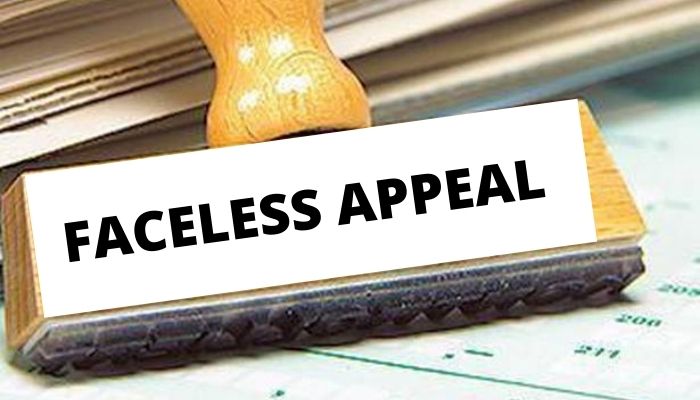Now a days, all assessments and appeals are being become faceless. In our earlier articles, we have discussed the faceless assessment. In this article, we will discuss faceless appeals. As we know that Section 250 of the income tax act relates to CIT appeals now in this section few subsections has been added which deals with faceless appeals.
As per the faceless appeal scheme 2020, the Following bodies will be part of this scheme:
- (Centralised Body): National Faceless Appeal Centre (NFApC)
- (Regional Centres): Regional Faceless Appeal Centre (RFApC)
- (Various Regions): Appeal Units (ApU) will be Comprised of one or more Commissioner (Appeals) and any other authority as prescribed by income tax law.
It is to be noted that final order will be passed by NFApC
Following are the functions of Appeal units:
- Admitting any additional grounds of the appeal
- Making the inquiries
- Directing the Assessing Officer or National Faceless Assessment Centre (NFAsC) for seeking information and clarifications, making further inquiry. It means if you want to seek any information then you have to contact NFAsC if they had done your assessment.
- Providing the opportunity of being heard
- Analysis of material furnished by Assessee or Assessing officer
- Review of the draft order
As we discussed above that now all the communication will be going through the national faceless appeal centre.
Now we will discuss the procedure for appeal:
- National faceless appeal centre (NFAsC) will assign the appeal to a specific unit in any one of the RFApC through the automated allocation system (AAS).
- If the appeal has been filed after the expiry of the time period available in section 249(2) then the appeal unit may accept the appeal if satisfied that if the appellant had sufficient cause for not filing of an appeal within the specific time. This shall also be intimated by the Appeal Unit to NFApC
- As per section 249 of the income tax act, where no return was filed, an appeal will not be accepted if the assessee pays assessed tax which is payable by him. As per this scheme, unless the appellant makes an application for the exemption from the condition and the appeal unit is satisfied for the reasons to be recorded in writing, the appeal unit may reject the admission. This shall also be intimated by the Appeal Unit to NFApC.
- Now, the Appeal unit will intimate the NFApC, who shall further intimate the same to the appellant.
- Where Appeal is admitted:
- The appeal unit may request NFApC to obtain any such further information, document or evidence from the appellant or another person which is required for making the appeal
- The appeal unit may request NFApC to obtain a report of NFAsC or Assessing Officer on grounds of appeal or document or evidence as filed by the appellant
- The appeal unit may request to NFApC to direct the NFAsC or Assessing Officer to make any further inquiry under section 250(4) and submit a report thereof.
- NFApC shall serve a notice upon appellant/another person/ NFAsC/ Assessing Officer to furnish evidence, documents or report as specified by the appeal unit.
- Appellant or any other person to file a response to the notice within the time mentioned therein to NFApC.
- Similarly, the NFAsC or Assessing Officer shall furnish a report within the time mentioned in the notice to NFApC.
- NFApC to forward such document/ report to the appeal unit. In case, if no response is received, then the said fact shall be intimated by NFApC to Appeal Unit.
- If the person who has filed the appeal, has forgotten to add one or more grounds in the appeal then for additional ground, an application shall be given by the appellant to NFApC. After that NFApC shall forward the same to the appeal unit and also to the assessing officer.

It is to be noted that additional ground can be admitted if the same is taken from the assessing officer order. Any new ground which has not been discussed anywhere, the deduction which has not been claimed anywhere, then it cannot be claimed to CIT(A).
NFAaC or assessing officer shall furnish comments to NFApC and NFApC shall furnish the same to the appeal unit. The appeal unit shall admit the ground when it is satisfied that such omission was not wilful or unreasonable and reject it in any other case and intimate such decision to NFApC
- National faceless appeal centre shall intimate the admission or rejection of ground to the appellant.
- Appellant may file to National faceless appeal centre (NFApC) additional evidence as permitted and according to the Rule 46A and specify how additional evidence is covered by Rule 46A. Where additional evidence is filed,
- NFApC shall send such evidence to NFAsC or Assessing Officer for furnishing a report on the admissibility of same as per Rule 46A.
- National faceless assessment centre NFAsC/ Assessing Officer to furnish such report to the National faceless appeal centre (NFApC) within the prescribed or the extended time as the case may be.
- National faceless appeal centre (NFApC) to forward such report to Appeal Unit or intimate in case no response is received.
- Appeal Unit shall consider the evidence and report, if any, and admit or reject the additional evidence for the reasons to be recorded in writing & intimate to the National faceless appeal centre (NFApC).
- NFApC shall intimate these admission/rejections to Appellant and NFAsC/ Assessing Officer.
- Where the additional evidence is to be admitted:
- Appeal Unit before considering the same in appellate proceedings, shall prepare a notice providing an opportunity of being heard to NFAsC or the Assessing Officer to Produce document/evidence/ witness in rebuttal of evidence or witness Produce by the appellant and to furnish a report
- Such notice shall be sent by the Appeal unit to the National faceless appeal centre (NFApC) who shall forward it to NFAsC or the Assessing Officer.
- NFAsC or the Assessing Officer to furnish the report within the time mentioned or the extended time to the NFApC who shall forward it to the Appeal Unit or to inform the latter in case, no response is received
- The NFAsC or the Assessing Officer may request to the NFApC to direct the production of the document or evidence or the examination of witness has produced by the assessee.
- National faceless appeal centre (NFApC) shall forward the request to the Appeal Unit.
- Appeal Unit, if deems fit, shall prepare a notice which is to be sent to NFApC and direct the appellant
- To produce document/evidence
- To examine any other person
- NFApC shall forward the notice to the appellant or witness
- Appellant/ witness shall file a response within the mentioned or extended time.
- National faceless appeal centre (NFApC) forward such response to the appeal unit or inform it in case of no response.
- Where the Appeal Unit aims to Enhance assessment or Enhance Penalty or reduce refund.
- Appeal Unit shall prepare a show-cause notice which contains the reasons for such enhancement/ reduction and forward it to NFApC
- National faceless appeal centre (NFApC) shall serve the notice on the appellant
- Appellant shall file a response within prescribed/ extended time to NFApC
- National faceless appeal centre (NFApC) shall forward the response to the Appeal Unit or intimate in case of no response.
Draft Order
Appeal Unit after considering all the facts collected and any matter arising out of the proceedings in which order appealed against was passed and notwithstanding with that such matter was not raised in the appeal, prepare a draft order and send same along with the details of penalty proceeding which is to be initiated to the National faceless appeal centre (NFApC).
Conclusion
I hope this article will give you an idea of how faceless processing is taking place now a days. Although if you have any queries relating to the faceless assessment or faceless appeals then you may contact us. We will happy to serve you.

